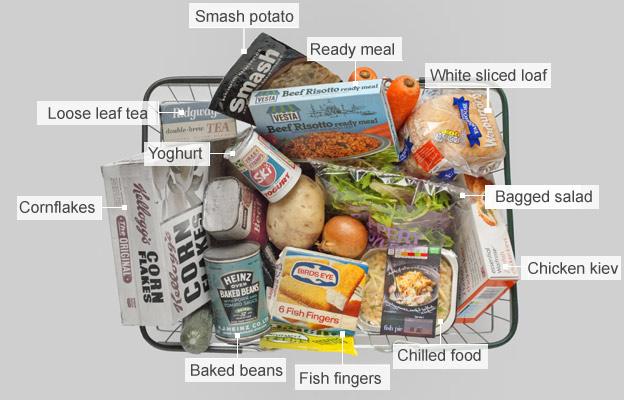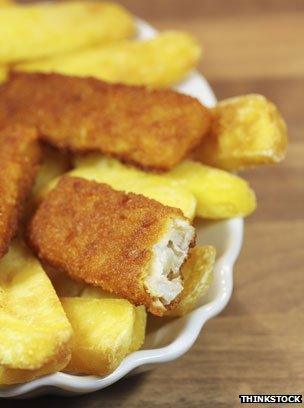The 'shopping basket' through the ages
- Published

All these items have cropped up over the past seven decades
Inflation in the UK is calculated with the help of a notional basket of goods. What goes in there tells us a lot about changing eating habits, writes Lucy Proctor.
Nearly 70 years ago, the UK first assembled a "national shopping list" to create a sample of everyday items to help calculate inflation. The list allowed changes in prices to be tracked. But as habits change, what is counted as "everyday" has evolved.
Cornflakes
Breakfast cereals first entered the basket in 1952. They were marketed first as a health food before the sugar-coated versions came along to entice children. In 1987 oats were replaced by muesli. In 2001 cereal snacks appeared, changing to cereal bars in 2010, a reflection of our increasing tendency to eat breakfast on-the-go.
Tea
Tea has appeared in every basket since 1947 in one form or another. Tea bags joined loose leaf tea in 1980, but then loose leaf was removed in 2002, reflecting a decline in sales. Herbal and fruit teas were added in 2001, but just for one year. By 2003 only tea bags remained.
Baked beans
Baked beans appeared in the first basket alongside other tinned ingredients such as peas. By 1976 canned tomatoes were in, and plenty of canned fruit. By 2009 canned foods were less popular and the only cans on the list were tomatoes, sweetcorn and beans.
Corned beef
Present in the first basket and by 1980 appeared as two distinct versions, sliced and canned. By 1993 it was gone, replaced by "canned meat". This reflected the change from tinned and potted meats to items such as pates, pies and charcuterie.
Yoghurt
Yoghurt first appeared in the 1974 basket. It was joined by Fromage Frais in 1993, flavoured milk in 1997, and chilled pot dessert in 2001. In 2003 baby milk formula and in 2008 pro-biotic drink were added. Losses in the dairy section over the years include UHT milk, TT (Tuberculin Tested) milk, and reduced cost welfare milk.
Smash
Invented in the 1960s Smash appeared in the 1974 basket due to a huge increase in sales driven by the famous adverts featuring Martian puppets. It was still in there in 1980, but by 1987 had been removed, replaced with frozen oven chips.
Ready meal
The ready meal appears in various guises in the basket, first as semi-prepared meal in 1980, then as frozen curry and rice in 1987. In 2002 both reduced calorie ready meal and frozen vegetarian ready meal were added, while in the 2013 basket, there's "ready cooked meal".
Fish fingers

Fish fingers were launched by Birdseye in 1955 and first appeared in the 1962 basket, alongside other processed and canned fish such as kippers and sardines. Frozen prawns were added in 1987 but removed a year later, and not seen again until 2002. By the 1990s canned tuna appeared, alternating with canned salmon.
Chilled food
Chilled food like chilled ready meals and chilled puddings are a recent addition to the basket thanks to the developments in hygiene and plastics technology since the 1980s. Pure fruit smoothie entered the basket in 2008, and chilled whole chicken and chilled dessert pots in 1993. Chilled food now makes up a huge part of our weekly shop.
Bagged salads
Amazingly lettuce didn't appear in the basket until 1987. Peppers went in in 1997. In 2000 pre-packed salads were added, along with broccoli, and in 2001 organic vegetables were added for the first time.
White sliced loaf
Another staple that's been in the basket from the beginning. In 1962 "sliced and unsliced" was added, along with brown bread, which came out in 2006. Pitta breads went in in 2000, only to come out in 2010 and be replaced by garlic bread, while in 2001 baguette was added, only to come out four years later.
Chicken Kiev
Although they were invented in 1979, chicken Kievs weren't added to the basket until 2006. This was to improve coverage of the growing processed poultry market. Omitted in 2008, they were back in in 2009, only to come out again in 2010 when hot rotisserie chicken went in.
The Inflating Shopping Basket presented by food journalist Andrew Webb will be broadcast on Sunday 18 January on Radio 4 at 13:30 GMT. You can listen to it after broadcast via the iPlayer or download the podcast.
Subscribe to the BBC News Magazine's email newsletter to get articles sent to your inbox